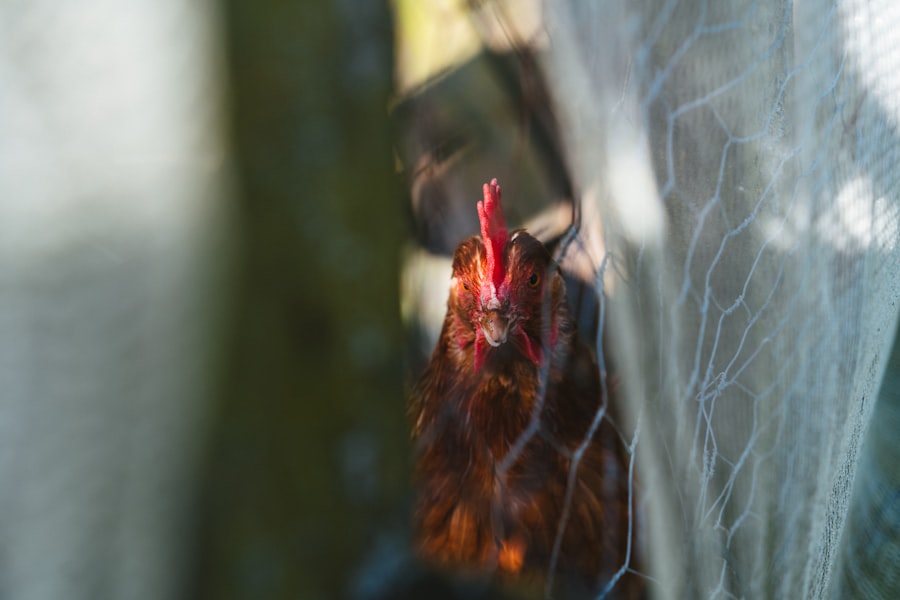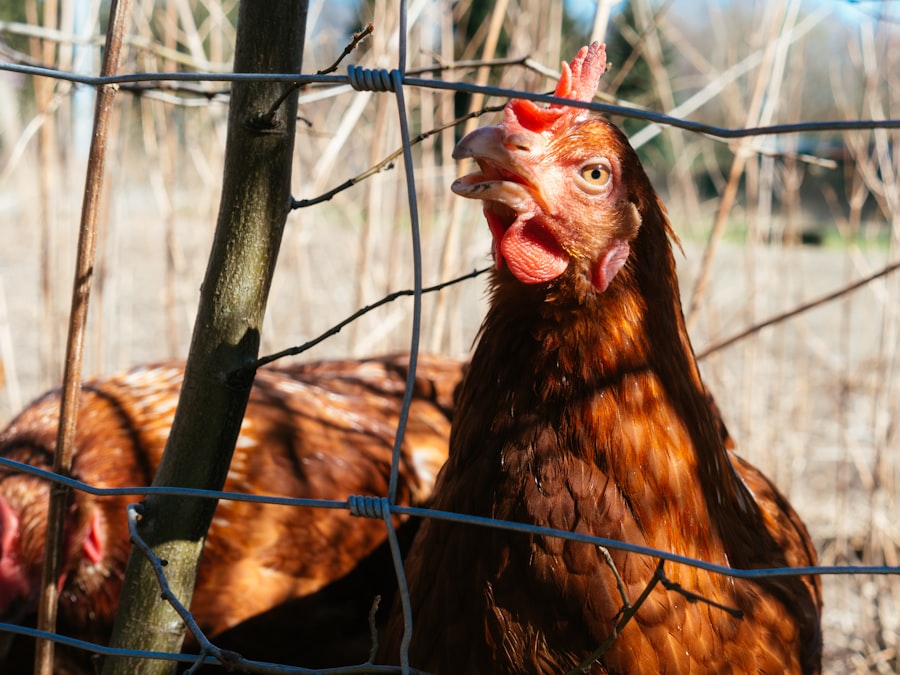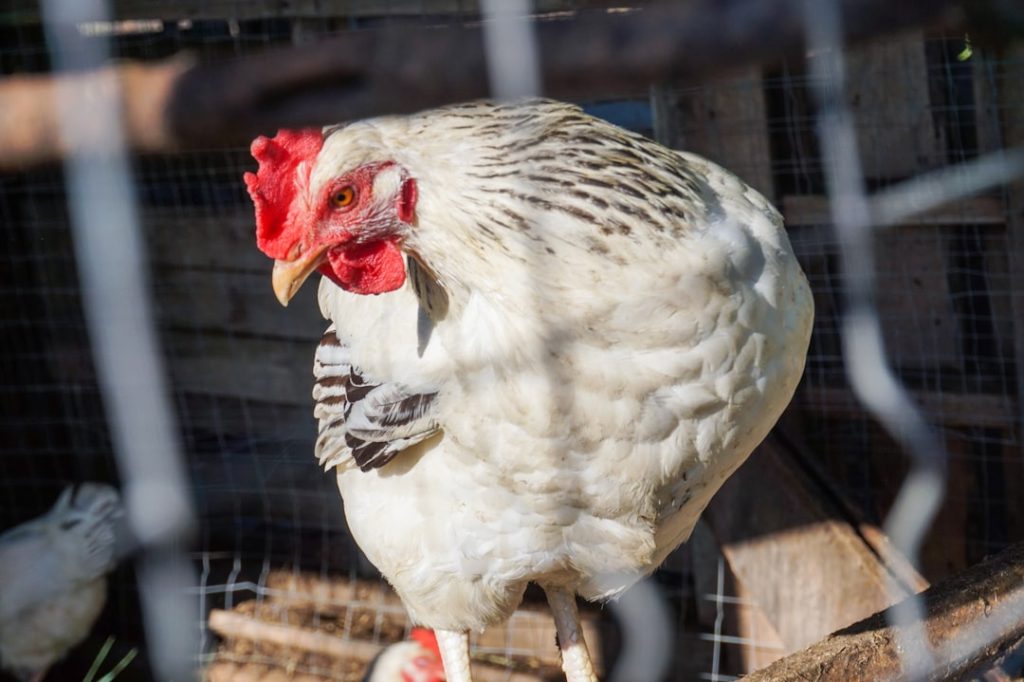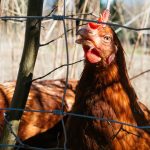Chickens are social animals that thrive in a flock environment. They have a natural pecking order, with dominant birds asserting their authority over subordinate ones. Understanding this behavior is crucial when raising chickens, as it can help prevent aggression and bullying within the flock.
Additionally, chickens are naturally curious and enjoy exploring their surroundings. They are also known to be territorial and will defend their space from perceived threats. By understanding these behaviors, chicken owners can create a more harmonious and enriching environment for their birds.
Furthermore, chickens have a natural instinct to forage for food. They will spend hours pecking and scratching at the ground in search of insects, seeds, and other edible items. This behavior is not only essential for their physical health but also provides mental stimulation.
Chickens also have a strong instinct to roost at night, seeking out elevated perches to sleep on. Understanding these natural behaviors can help chicken owners provide an environment that meets their birds’ needs and allows them to exhibit their natural behaviors.
Table of Contents
- 1 Providing Adequate Space and Enrichment
- 2 Implementing Proper Fencing and Barriers
- 3 Using Natural Deterrents
- 4 Creating Designated Foraging Areas
- 5 Supervising Free-Range Time
- 6 Training and Redirecting Behavior
- 7 FAQs
- 7.1 What are some ways to keep chickens from tearing up the yard?
- 7.2 Why do chickens tear up the yard?
- 7.3 How can I create a designated area for chickens to scratch and forage?
- 7.4 What are some enrichment activities for chickens to keep them from tearing up the yard?
- 7.5 Are there any plants or landscaping features that can help prevent chickens from tearing up the yard?
Key Takeaways
- Chickens are social animals that exhibit natural behaviors such as scratching, dust bathing, and foraging.
- Providing adequate space and enrichment, such as perches and nesting boxes, is essential for the well-being of chickens.
- Proper fencing and barriers are necessary to keep chickens safe from predators and to prevent them from wandering into unwanted areas.
- Natural deterrents, such as predator decoys and motion-activated sprinklers, can help protect chickens from potential threats.
- Designating specific areas for foraging can help chickens satisfy their natural instincts and reduce destructive behavior in other areas.
Providing Adequate Space and Enrichment
Space for Well-being
Chickens that are overcrowded can become stressed and may exhibit aggressive behaviors towards one another. Providing enough space for each bird to move around freely and engage in natural behaviors such as foraging and dust bathing is crucial for their physical and mental health.
Enrichment for Mental Stimulation
Additionally, providing enrichment such as perches, dust bathing areas, and toys can help keep chickens mentally stimulated and prevent boredom.
Access to the Outdoors
In addition to space and enrichment, it is important to provide chickens with access to fresh air and natural light. This can be achieved by allowing them access to outdoor areas where they can forage and explore. Outdoor access not only provides chickens with a more natural environment but also allows them to engage in natural behaviors such as sunbathing and dust bathing.
Creating an Enriching Environment
By providing adequate space, enrichment, and access to the outdoors, chicken owners can create a more enriching environment for their birds.
Implementing Proper Fencing and Barriers

Proper fencing and barriers are essential when raising free-range chickens. Fencing helps keep chickens safe from predators and prevents them from wandering into areas where they may cause damage or become a nuisance. When implementing fencing, it is important to consider the size and strength of the birds, as well as the types of predators in the area.
Additionally, barriers such as hedges or shrubs can help create designated areas for chickens to forage while also providing protection from predators. Furthermore, proper fencing and barriers can help prevent conflicts with neighboring properties or other animals. Chickens have a natural instinct to explore their surroundings, and without proper fencing, they may wander onto neighboring properties or into areas where they are not welcome.
By implementing proper fencing and barriers, chicken owners can create a safe and secure environment for their birds while also preventing conflicts with neighbors and other animals.
Using Natural Deterrents
When raising free-range chickens, it is important to use natural deterrents to keep predators at bay. Natural deterrents such as predator-resistant plants, decoy animals, and sound devices can help deter predators from entering the area where chickens roam. Additionally, using natural scents such as lavender or garlic can help repel predators without harming the chickens or the environment.
In addition to natural deterrents, it is important to remove attractants that may draw predators to the area. This includes securing food sources, such as feeders and compost piles, and removing any potential hiding spots for predators. By using natural deterrents and removing attractants, chicken owners can help keep their birds safe from predators while also maintaining a natural and environmentally friendly approach to pest control.
Creating Designated Foraging Areas
Creating designated foraging areas for free-range chickens can help prevent them from wandering into areas where they may cause damage or become a nuisance. By designating specific areas for chickens to forage, chicken owners can control where their birds roam while also providing them with ample space to engage in natural behaviors such as scratching and pecking. Additionally, creating designated foraging areas can help prevent conflicts with neighbors or other animals by keeping chickens contained within a specific area.
Furthermore, creating designated foraging areas can help protect sensitive plants or landscaping from being damaged by chickens. By providing chickens with a designated area to forage, chicken owners can ensure that their birds have access to fresh food sources while also protecting their property from potential damage. By creating designated foraging areas, chicken owners can provide their birds with ample space to engage in natural behaviors while also preventing potential conflicts with neighbors or damage to property.
Supervising Free-Range Time

Monitoring Behavior and Intervening When Necessary
Supervising free-range time allows chicken owners to keep a close eye on their birds’ behavior, intervene in any potential conflicts or issues, and ensure that they are not causing damage or becoming a nuisance. This close monitoring enables owners to address any problems promptly, preventing them from escalating into more serious issues.
Observing Interactions with Other Animals and Neighbors
In addition to monitoring behavior, supervising free-range time allows chicken owners to observe their birds’ interactions with other animals or neighbors. This can help prevent potential conflicts or issues from arising and allow chicken owners to address any concerns before they escalate.
Striking a Balance Between Freedom and Safety
By supervising free-range time, chicken owners can provide their birds with ample space to roam while also ensuring their safety and preventing potential conflicts or issues. This balance is crucial for raising happy and healthy free-range chickens.
Training and Redirecting Behavior
Training and redirecting behavior is an important aspect of raising free-range chickens. Chickens are intelligent animals that can be trained to respond to cues and commands. By training chickens to come when called or respond to certain signals, chicken owners can help prevent potential issues such as wandering onto neighboring properties or becoming a nuisance.
Additionally, redirecting behavior through positive reinforcement can help address any unwanted behaviors such as aggression or bullying within the flock. Furthermore, training and redirecting behavior can help create a more harmonious environment for both the chickens and their owners. By teaching chickens to respond to cues and commands, chicken owners can better manage their birds’ behavior and prevent potential conflicts or issues from arising.
Additionally, redirecting behavior through positive reinforcement can help address any unwanted behaviors while also strengthening the bond between chickens and their owners. In conclusion, understanding the behavior of chickens is crucial when raising free-range birds. Providing adequate space and enrichment, implementing proper fencing and barriers, using natural deterrents, creating designated foraging areas, supervising free-range time, and training and redirecting behavior are all important aspects of creating a harmonious environment for free-range chickens.
By understanding their natural behaviors and needs, chicken owners can provide an enriching environment that allows their birds to thrive while also preventing potential conflicts or issues from arising.
If you’re looking for ways to keep chickens from tearing up your yard, you may also be interested in learning about how to properly place a chicken coop. This article from Poultry Wizard discusses the best location for a chicken coop to ensure the health and safety of your flock. Check it out here.
FAQs
What are some ways to keep chickens from tearing up the yard?
Some ways to keep chickens from tearing up the yard include providing them with a designated area for scratching and foraging, using chicken wire or fencing to create barriers, and providing them with plenty of enrichment and activities to keep them occupied.
Why do chickens tear up the yard?
Chickens tear up the yard as a natural behavior to forage for food, dust bathe, and scratch for insects and other small creatures. This behavior is instinctual and necessary for their well-being.
How can I create a designated area for chickens to scratch and forage?
You can create a designated area for chickens to scratch and forage by using chicken wire or fencing to section off a specific area of the yard. You can also provide them with a designated space within their coop or run that is filled with loose soil or sand for scratching and dust bathing.
What are some enrichment activities for chickens to keep them from tearing up the yard?
Enrichment activities for chickens can include providing them with hanging treats, puzzle feeders, and toys such as mirrors or hanging objects for pecking. Additionally, allowing them access to a variety of vegetation and natural materials can help keep them occupied and prevent excessive yard tearing.
Are there any plants or landscaping features that can help prevent chickens from tearing up the yard?
Planting dense ground cover, such as clover or low-growing shrubs, can help prevent chickens from tearing up the yard by providing them with alternative areas to forage and scratch. Additionally, creating raised beds or using decorative rocks or mulch can help protect delicate landscaping features from chicken damage.
Meet Walter, the feathered-friend fanatic of Florida! Nestled in the sunshine state, Walter struts through life with his feathered companions, clucking his way to happiness. With a coop that’s fancier than a five-star hotel, he’s the Don Juan of the chicken world. When he’s not teaching his hens to do the cha-cha, you’ll find him in a heated debate with his prized rooster, Sir Clucks-a-Lot. Walter’s poultry passion is no yolk; he’s the sunny-side-up guy you never knew you needed in your flock of friends!







